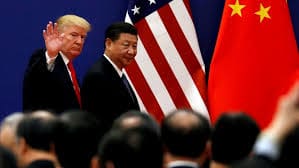Beijing says it will increase tariffs on 5,140 US products worth $60 billion from June 1.
China said on Monday it would impose higher tariffs on a range of US goods including frozen vegetables and liquefied natural gas, striking back in its trade war with Washington after US President Donald Trump warned it not to. The move, widely expected after the United States last week raised tariffs on $200 billion in Chinese imports, heightened fears the world’s two largest economies were spiraling into a no holds-barred dispute that could derail the global economy. China’s finance ministry said it plans to set import tariffs ranging from 5% to 25% on 5,140 US products on a revised $60 billion target list. It said the tariffs will take effect on June 1. “China’s adjustment on additional tariffs is a response to US unilateralism and protectionism,” the ministry said. “China hopes the US will get back to the right track of bilateral trade and economic consultations and meet with China halfway.” The White House and US Trade Representative’s office did not immediately respond to requests for comment.
Global equities, which slumped last week on the escalating tensions, fell sharply, with major US indexes down more than 2%. Investors sought safety in US bonds while the US dollar slipped against a basket of currencies. “It’s clear that there is a lot of nervousness around the US-China trade negotiations and concern that it’s really deteriorating pretty significantly, and that’s impacting all areas of markets,” said Kristina Hooper, chief global market strategist at Invesco in New York. Earlier on Monday, Trump told China not to intensify the trade dispute and urged its leaders, including President Xi Jinping, to continue to work to reach a deal. “China should not retaliate-will only get worse,” he said on Twitter. “I say openly to President Xi & all of my many friends in China that China will be hurt very badly if you don’t make a deal because companies will be forced to leave China for other countries,” Trump wrote. The US president, who has embraced protectionism as part of an “America First” agenda, stepped up his verbal attacks on China on Friday after two days of high-level trade talks in Washington ended with the two sides at an apparent stalemate.

